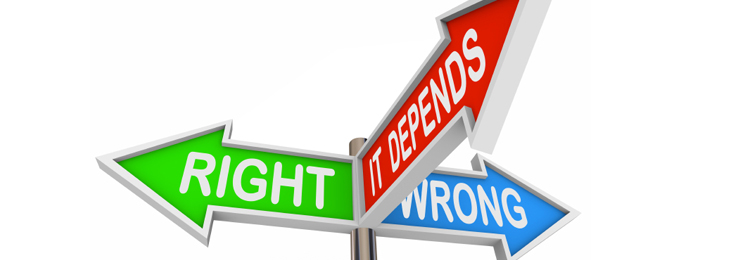
By Joseph Griffin.
Joseph A. Griffin, PMP® is a faculty member in Northeastern University’s Master of Science in Project Management program. He is an active member of the international chapter of the Project Management Institute, and serves as the VP of Professional Development for the PMI-Metrolina chapter in Charlotte, NC.
Recently, I surveyed 485 professional project managers—a sizable group. A whopping 43 percent reported that they had faced an ethically challenging situation at work on a monthly basis.
Meanwhile, 57 percent reported that they were ethically challenged a few times per year. These managers felt pressured to make a decision that violated their ethical values or the values of their company, whether it was fudging numbers to appease a client or bypassing hardworking Bob, the project assistant, for a promotion due to office politics. (We’ve all been there, right?)
In theory, these statistics should be surprising. The Project Management Institute puts forth a standard code of ethics that demands responsibility, respect, fairness and honesty.
Still, despite a well defined code of conduct, many companies, including providers of higher education, have a hard time implementing these ethics. And it’s usually your employees who feel the stress.
To bridge the gap, here are five steps that can give you (and your business) a clear conscience.
1. Identify your ideal values.
Let people tell you what they really think! I recommend offering employees a survey wherein they list the top three things they value most at their organization. What do they believe in? Why? Chances are their answers will fall into one of the four categories in the code of ethics above.
2. Identify your realistic values.
Now it’s time to contextualize the PMI code of ethics to suit your unique environment, taking that survey into account. Write out a mission statement, tweaking the PMI code to fit your organization’s culture. If you work in a very large company, perhaps “honesty” becomes “transparency.” In a meeting-based culture, maybe “fairness” is “open communication.”
3. Create opportunities for people to execute values without repercussions.
Your ideals are only as good as your actions. So empower people to make decisions that carry forth your goals.
One of the most common work scenarios is people tweaking numbers when reporting to a client. If one of your values is transparency, set a precedent: Be upfront with a client, even if your project is behind schedule or off budget. Your client might be ruffled in the short term, but ultimately, they’ll appreciate that you value honesty.
Meanwhile, you’ve set an example: You’re willing to make tough but ethical decisions, and so can they.
4. Recognize the many versions of success and failure.
Sure, Janet in marketing might be great; she just closed a deal and netted the company millions. But also recognize Sue, who went the extra mile for a customer, even if it did nothing for the immediate bottom line.
As for failure, I’m often reminded of one of my favorite bosses. He had a plaque on his desk that read “Mistakes Welcome Here.” Weird, right? Smart! He was open to bad news; his direct reports knew that they could share struggles, learn, and move forward. Let’s be honest: Everyone will make mistakes. Better to know about them.
5. Mentor new employees.
Foster an ethical environment by on-boarding people properly. Be transparent. Host workshops. Offer case studies and explain how thorny situations were handled. Take every opportunity to show new hires how employees are working ethically, through their interactions and their decision-making.
Ultimately, ethics is a team sport. Your goal is to build a community that unites behind shared, valued norms that transcend everyday stresses.